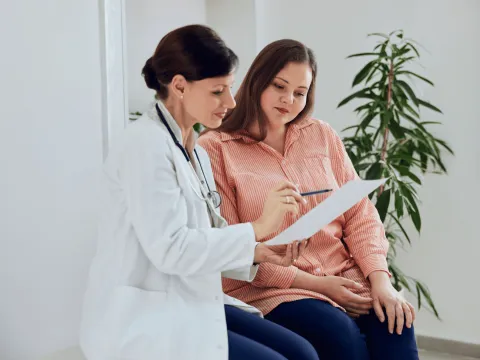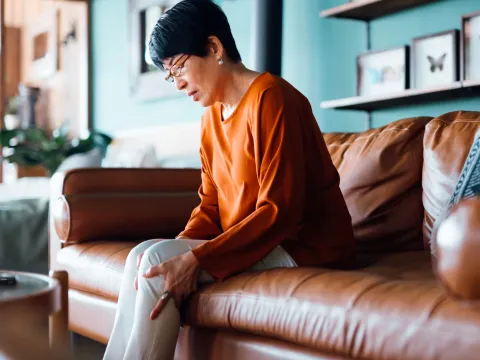- AdventHealth

There's a saying in medicine: When you hear hoofbeats, think of horses not zebras.
Its a simple reminder for doctors to consider that symptoms are more often caused by common illnesses than rare ones.
For Millennials those now 22 to 37 years old colon cancer is still rare enough to be like a zebra, but it is looking more like a horse in recent years.
Though the trend is too recent to be ironclad, it appears that colon cancer is seeing a slow but steady upswing among people in their 20s, 30s and 40s.
It can be particularly devastating for younger victims precisely because it is so unexpected. Routine testing for the disease in healthy people which can find colon cancer before symptoms appear, when treatments are more effective does not typically begin until age 50.
And when symptoms appear in young people, they are often written off as something else, so the cancer often progresses without treatment.
But, as new discoveries change these attitudes, doctors are paying more attention to the possibility of colon cancer among younger patients, says Mari Rivera, MD, a gastroenterologist with AdventHealth.
Dr. Rivera and her colleagues at AdventHealth are eager to help their younger patients take extra steps to protect themselves from colon cancer, the second-leading cause of cancer deaths in the United States. Not every case of colon cancer can be prevented, but Millennials can take steps to stack the odds in their favor.
We've compiled five tips to help you take all the steps you can and hopefully earn some peace of mind.
1. Be Vigilant About Your Symptoms
Dr. Rivera's first piece of advice is to talk to your doctor about any potential symptoms so you can work together to rule out the worst-case scenario. Watch out for the following:
- Rectal bleeding
- Anemia (low red blood cell count)
- Abdominal pain and bloating
- Constipation
- Weight loss
One of the reasons that colon cancer is often discovered later in young people is that both they and their doctors may assume symptoms are caused by another, more common problem. In other words, they are looking for horses and totally ignoring zebras.
The best way to take this advice is to develop a relationship with a primary care provider. Some people find it embarrassing to talk about their digestive symptoms, and having a doctor you trust can make that conversation easier.
2. Keep an Eye on Risk Factors
Like smoking increases the risk of developing lung cancer, there are behaviors and habits that can predispose one to develop colon cancer, Dr. Rivera says. Her recommendations include:
- Eat a high-fiber diet
- Minimize processed meat and processed foods
- Limit use of alcohol
- Exercise (at least 150 minutes of moderate-intensity activity per week for most adults)
- Don't smoke
- Keep weight under control
Unfortunately, one of the mysteries of the increase in colon cancer risk for young adults is there is not a clear association with an established risk factor.
There are a few theories out there, Dr. Rivera says. We are certainly eating more processed foods, so perhaps the young generation is being exposed to more processed meats.
No matter what's causing the recent increase in this form of cancer in younger patients, taking these steps now and making them habits will help protect you from the illness as an older adult.
3. Be Persistent
Well aware of the uptick in colon cancer among the young, Dr. Rivera doesn't use young age as an excuse not to order a diagnostic test to investigate worrying symptoms.
I have lowered my threshold to do colonoscopies in patient populations in their late 30s and early 40s, she says.
But some doctors may not consider colon cancer and avoid ordering tests even when symptoms indicate them. If you feel as if somethings not right, don't hesitate to ask to see a specialist.
It may also help to ask your doctor about whether the newest tools to diagnose colon cancer might work for you. While a colonoscopy remains the gold standard, new technology such as blood tests are emerging as alternatives for some people.
I wouldn't be surprised if we have blood screening methods in five years, Dr. Rivera says.
4. Be Proactive, But Don't Panic
One study found the risk of colon cancer for adults born in 1990 is twice that of an adult born in 1950. But two times a small risk is still a small risk.
Even though colon cancer incidence is increasing in the younger population, it's still relatively rare in the sense that the majority of colon cancers are diagnosed in patients in their 60s, Dr. Rivera says. Nine in 10 cases still occur in people older than 50.
People do panic, and say Do I have colon cancer? she says.
However, most abdominal symptoms, of course, have nothing to do with colon cancer.
Its a matter of being proactive and looking at your symptoms. Talk to a gastroenterologist and they should be able to guide you, Dr. Rivera says.
5. Learn Your Own Risk
Statistics are good at describing health risks for large numbers of people, but each person is unique, with their own strengths and challenges.
Though current guidelines suggest most adults should have their first colonoscopy at age 50, that recommendation changes for people whose relatives had the disease.
That advice is especially important for people with family members who had the disease before they were 50. Many of these people should get a colonoscopy 10 years before their relative was diagnosed.
Moreover, some medical groups suggest those with African-American ethnicity should begin screening at 45, not 50.
For Millennials, though, there is not yet enough medical evidence to suggest that healthy people those without symptoms should be tested for colon cancer, Dr. Rivera says. Though rare, there are potential risks posed by colonoscopies, and it's not yet clear if they would outweigh the benefits of more tests in younger people.
We still don't have enough long-term data on this increase to help us determine whether they would benefit from earlier screening, she says.
Meanwhile, the best way to lower your risk for all sorts of cancer is to form a relationship with a primary care physician who can help you stay vigilant for signs and symptoms. Even the thought of cancer can be frightening, but knowing you're doing all you can to protect your health will help you feel more empowered.
Because so many of these tips depend on a strong relationship with a primary care physician, that's the single best step to lower your cancer risk. AdventHealth Medical Group's physician finder allows you to search by zip code, specialty, languages spoken, ages served and more to find a doctor who's the right fit for you.



